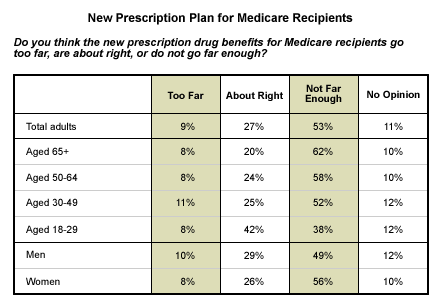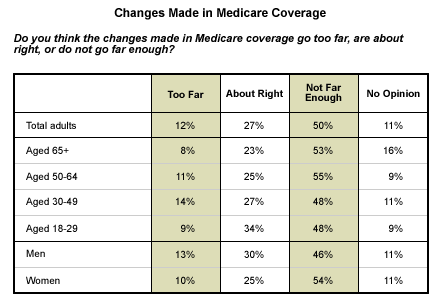In December 2003, President George Bush signed sweeping changes to the existing Medicare program into law. The revisions include, to name a few: providing recipients with discounted prescriptions using a drug card; allowing seniors to join private drug plans, testing competition between private insurers and the government; offering income-based plans for paying doctor bills; and providing limited tax-free health savings accounts.
While improvements to Medicare, especially with regard to drug benefits, have long been a goal for the government and Americans at large (particularly retirees), reactions to the changes have been mixed. According to a Gallup Poll, conducted Jan. 2-5, 2004*, roughly half of adults (53%) say that the new prescription drug benefits for Medicare recipients do not go far enough.
Seniors are more likely than younger respondents to feel that the legislation falls short. Among Americans aged 65 and older, 62% say that the changes do not go far enough. The opinions of young adults (aged 18 to 29) are more evenly split between feeling the drug benefits are about right (42%) and feeling they don't go far enough (38%). Women are slightly more likely than men to say that the new prescription benefits do not go far enough (56% vs. 49%).

Gallup also asked Americans about the changes to Medicare coverage and garnered similar results -- half of adults say that the changes in coverage do not go far enough.
Many of the new provisions will not take effect until 2006, and a number of Americans currently in the 50-to-64 age bracket will be eligible for Medicare benefits by that time. Those in this age group share the view that the changes in coverage fall short, with 55% saying they don't go far enough. As with responses to the prescription drug coverage question, women are slightly more likely than men to say the changes in Medicare coverage are inadequate -- 54% of women hold this view, compared with 46% of men.

Bottom Line
The new $400 billion legislation represents the first significant change to Medicare since it was created in 1965. Upon signing the bill, Bush characterized the legislation as a "victory for all of America's seniors" -- yet the poll data suggest that seniors are skeptical about the adequacy of the new measures. When the law takes full effect in 2006, many will evaluate the impact of the changes on their health and their wallets to see if their skepticism was justified.
*Results are based on telephone interviews with 1,029 national adults, aged 18 and older, conducted Jan. 2-5, 2004. For results based on the total sample of national adults, one can say with 95% confidence that the maximum margin of sampling error is ±3 percentage points.